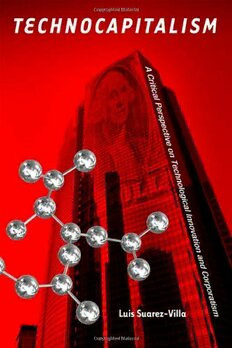
Technocapitalism: a critical perspective on technological innovation and corporatism PDF
230 Pages·2009·1.288 MB·English
Most books are stored in the elastic cloud where traffic is expensive. For this reason, we have a limit on daily download.
Preview Technocapitalism: a critical perspective on technological innovation and corporatism
Description:
A new version of capitalism, grounded in technology and science, is spawning new forms of corporate power and organization that will have major implications for the twenty-first century. Technological creativity is thereby turned into a commodity in new corporate regimes that are primarily oriented toward research and intellectual appropriation. This phenomenon is likely to have major social, economic, and political consequences, as the new corporatism becomes ever more intrusive and rapacious through its control over technology and innovation.In his provocative book Technocapitalism, Luis Suarez-Villa addresses this phenomenon from the perspective of radical political economy and social criticism. Grounded in the premise that relations of power influence how human creativity and technology are exploited by the new corporatism, the author argues that new forms of democratic participation and resistance are needed, if the social pathologies created by this new version of capitalism are to be checked.Considering the new sectors affected by technocapitalism, such as biotechnology, nanotechnology, bioinformatics, and genomics, Suarez-Villa deciphers the common threads of power and organization that drive their corporatization. These new sectors, and the corporate apparatus set up to extract profit and power through them, are imposing standards, creating business models, molding social governance, and influencing social relations at all levels. The new reality they create is likely to affect most every aspect of human existence, including work, health, life, and nature itself.
See more
The list of books you might like
Most books are stored in the elastic cloud where traffic is expensive. For this reason, we have a limit on daily download.
